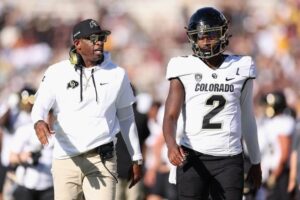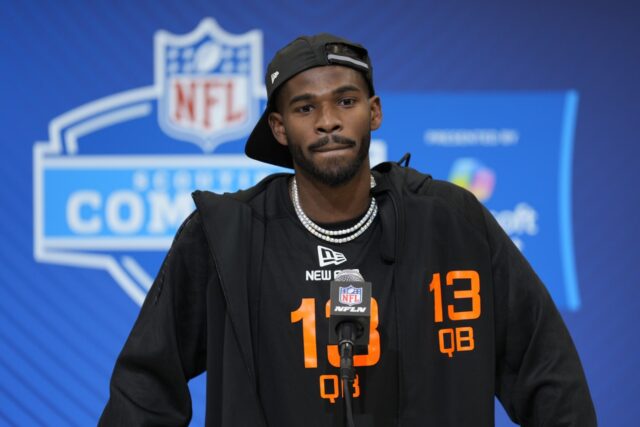New York, NY—-The NFL Draft is one of the most anticipated events in sports, a moment where dreams are realized and futures are determined. But for Shedeur Sanders, the son of Hall of Famer Deion Sanders, the 2025 Draft was supposed to be the culmination of years of hard work and talent.
Instead, Shedeur’s fall to the fifth round raised more than a few eyebrows — and sparked conversation about race, privilege, and the lingering systemic issues that continue to plague the NFL.
For many, the reality of Shedeur Sanders dropping to the fifth round was hard to reconcile with his performance on the field. Over the past two seasons at Jackson State and Colorado, Sanders has shown remarkable poise, skill, and leadership as a quarterback. His statistics speak for themselves: a strong passer with impressive decision-making, Sanders had all the tools that NFL teams typically look for in a quarterback.
However, his draft placement seems to suggest that those tools, along with his high-profile college career, weren’t enough to secure him a spot in the first or second rounds — a reality that seems to echo a troubling pattern in the NFL.
In many ways, Shedeur’s draft snub bears a striking resemblance to the treatment of another prominent football legacy — the Manning family. Archie Manning, the father of Eli and Peyton Manning, was a prominent quarterback in the NFL, and while Archie may not have reached the elite heights of his sons, his influence was undeniable.

He helped pave the way for Eli, ensuring that Eli was in the perfect position to succeed as the number one overall pick in 2004 — a rare and highly coveted spot. In fact, there’s a direct correlation between Archie’s behind-the-scenes influence and Eli’s place at the top of the draft.
However, when Deion Sanders, an iconic figure in both football and culture, did something similar for his son Shedeur — guiding him through the college ranks, offering mentorship, and leveraging his platform to put Shedeur in the best possible position to succeed — the reaction was starkly different.
The NFL, which has a long history of racial inequality, seems to have sent a clear message: there’s a price to be paid when you challenge the status quo, especially when it involves a high-profile Black player and his family.
The racial undertones of Shedeur Sanders’ fall in the draft cannot be ignored. It’s no secret that the NFL, despite its overwhelmingly Black player base, has long struggled with systemic racism. From coaching hires to front-office positions, Black players and coaches have found themselves relegated to certain roles, their careers often stymied by an old guard that resists change.
In Shedeur’s case, his father, Deion Sanders — one of the most charismatic and influential figures in sports — was viewed by some as an outsider who wasn’t playing by the traditional rules of the NFL.
What’s even more striking is how Shedeur’s situation parallels the treatment of his father. Deion Sanders, an outspoken advocate for change, became the target of criticism when he took the job at Jackson State University, a historically Black college (HBCU), and later, when he moved to Colorado. The backlash wasn’t just about his coaching style or his success on the field; it was about the way Deion Sanders chose to use his power and influence to uplift his community.

Just as Archie Manning’s status as a former NFL quarterback helped his son Eli, Deion Sanders did the same for Shedeur — yet Deion’s efforts were met with a harsher response, one that many perceive as rooted in racial bias.
It’s impossible to ignore the larger implications of Shedeur’s draft snub. In a league where African American quarterbacks are still the exception rather than the rule, the fallout from Shedeur’s fall to the fifth round signals a broader issue with how Black talent is perceived and evaluated.
Despite the undeniable success of Black quarterbacks like Patrick Mahomes, Lamar Jackson, and Jalen Hurts, the NFL still struggles to break free from outdated, racialized views about who belongs at the top of the draft.
The reality is that Black quarterbacks often have to work twice as hard to prove themselves, even in the face of undeniable talent. Just as Shedeur Sanders had to navigate the complexities of being the son of one of the NFL’s most well-known figures, Black players across the league must constantly prove that their abilities aren’t defined by stereotypes or biases.
While players like Peyton and Eli Manning, who come from a long line of football royalty, are routinely elevated to the top of the draft, Black players like Shedeur Sanders must fight to be recognized on their own merits — even when their statistics and on-field performance mirror, or even exceed, their white counterparts.
In the end, Shedeur’s drop to the fifth round is a sobering reminder that despite the progress made in recent years, the NFL still has a long way to go in confronting its deep-seated racial issues. For every Archie Manning whose influence helps elevate his son, there are countless Deion Sanderses, whose efforts to uplift their children are met with resistance.
The NFL must ask itself hard questions about why Black talent is still judged so differently and why, even in an era where diversity should be embraced, systemic barriers remain firmly in place.
As for Shedeur Sanders, his journey is far from over. Whether or not he becomes a star in the NFL, his path will always be marked by the efforts of his father and the challenges they both faced in the name of legacy and progress. If there’s one thing the NFL can’t deny, it’s that Shedeur Sanders has the skill, determination, and pedigree to prove them all wrong.
But his story is also a reflection of a system that still has a long way to go in terms of racial equality and fairness.






